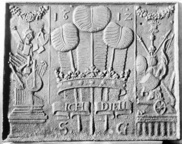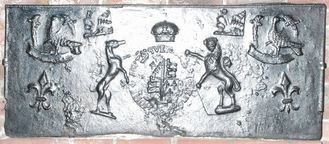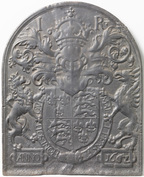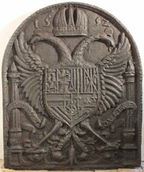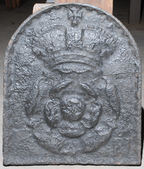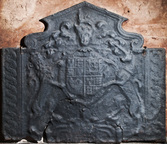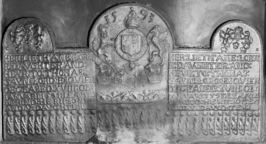-
995
Description: Arched; fillet edging; English royal Stuart shield, garter, crown, supporters, 'CS' monogram to left of Garter buckle, and motto on a cartouche; small rose stamp repeated each side of crown; date split each side of top of crown (first part absent in this casting).
Notes: Although English arms, the design is in a continental style, arched firebacks being typical of Lorraine; the 'CS' monogram is likely to be that of the pattern-maker; a modern copy of a poor casting, hence the incomplete date. For the complete version see no. 994. Inferior copies of this fireback were advertised in Kings Worthy Foundry's (Winchester) catalogue in the mid-20th century.
Copies of this fireback are known.
Inscription: [16 missing] 21 / HONI SOIT QVI MAL Y PENSE / CS / DIEV ET MON DROIT
Arms: English Stuart royal (James I)
- Decoration tags:
- rounded arched (shape)
- cavetto (edging)
- whole carved pattern
- planklines
- monogram
- armorial
- royal
- text
Manufactured: in 1621 in England.
Current location: not known.
- Attached to series:
- Jacobean royal armorial firebacks
- Stuart royal armorial firebacks
-
1291
Description: Rectangular shape; astragal with cavetto-moulded edging; decoration in three vertical sections each divided by a fillet; central section: three ostrich feathers within a coronet and a motto scroll - ICH DIEN (I serve); at the top, the date split either side of the uppermost feather; at the bottom, initials - SG - split either side of the quills; left panel: on a pedestal, an arrangement of musical and scientific instruments and books below a floral swag with a central rose; right panel: on a palisade, a triumph of martial arms - cannon, drum, shield, spear, flag etc. - beneath a floral swag and handful of arrows.
Notes: The three ostrich feathers within a coronet and the motto, Ich Dien, are the badge of the Prince of Wales. Probably a fireback in honour of Henry Frederick, Prince of Wales, oldest son and heir of King James VI of Scotland, I of England, with the date added to commemorate his death in 1612. The initials are likely to be those of the pattern maker.
Inscription: 16 12 / ICH DIEN / S G
- Decoration tags:
- rectangular (shape)
- astragal with cavetto (edging)
- whole carved pattern
- individual numbers
- heraldic
- pictorial
- historical
- architectural
- royal
- text
- objects
Manufactured: in 1612 in the Eifel area of Germany.
Current location: not known.
Museum number: RBA 37533 (part of the Ahrgau-Museum, Ahrweiler museum group)
- Attached to series:
- Prince of Wales firebacks
- Miscellaneous royal firebacks
-
10
Description: Rectangular; rope edging (top and sides); central Tudor royal shield with encircling garter (motto reversed: HONE SOVT QVEY … PEN), separate greyhound and lion supporters, separate crown; a bird, repeated in each top corner, its wings displayed and inverted and its head facing behind and to the left, standing on a scroll; a fleur de lys repeated in the bottom corners; inside the birds is a repeated stamp, half of one similar to a stamp on a fireback in Hastings Museum.
Notes: The particular form of the Tudor arms and supporters is encountered on other firebacks, as are the distinctive style of fleurs de lys and the birds (probably swans, a Lancastrian icon). The plain scroll upon which the bird is perched suggests that there might have been a painted inscription on it originally and that the stamp had not been made specifically for the decoration of firebacks but was, perhaps, redundant from interior domestic decoration. Formerly at Framfield, East Sussex.
Arms: Tudor royal (prob. Elizabeth I)
- Decoration tags:
- rectangular (shape)
- rope (edging)
- carved stamps
- heraldic
- armorial
- royal
- objects
Manufactured: in the mid- to late-16th century possibly at Pounsley Furnace, Framfield in the Weald area of England.
Current location: The Clergy House, Alfriston, East Sussex, England.
Museum number: 200044 (part of the National Trust museum group)
-
145
Description: Arched shape; cavetto moulded edging; shield, crown, tassels and ribbons, of the combined kingdom of Castille, Aragon, Leon and Sicily.
Notes: Probably the arms of King Charles V of Spain; quarterly (1 & 4) Castille and Leon, (2 & 3) Aragon and Aragon-Sicily.
Inscription: 15 [?]0
Arms: Royal House of Trastámara (Spain)
- Decoration tags:
- rounded arched (shape)
- cavetto (edging)
- whole carved pattern
- armorial
- royal
Manufactured: in 1550 probably at Eisenschmitt Furnace in the Eifel area of Germany.
Current location: in private hands, Érezée, Luxembourg, Belgium.
- Attached to series:
- Foreign armorial firebacks
-
1231
Description: Arched rectangular shape; ovolo-moulded edging; shield, Garter, crowned helm and mantling of the English royal arms to 1603 with crowned lion and griffon supporters standing on separate rectangular cartouches containing the word 'ANNO' and the date '1662'; above the mantling are the initials 'I R'
Notes: The date appears to have been altered from 1602. The initials 'I R' for Jacobus Rex (James I of England) are inappropriate for the date in both its original and its altered form; also the griffon supporter on the sinister side is incorrect, a dragon being correct for the arms of Elizabeth I in 1602. There is a vertical plankline left of centre.
Inscription: I R / HONI SOIT QVI MAL I PENSE / ANNO 1662
Arms: English Tudor royal
- Decoration tags:
- rounded arched (shape)
- ovolo (edging)
- whole carved pattern
- individual letters
- planklines
- heraldic
- armorial
- royal
- text
Manufactured: in 1662 possibly in the Ardennes area of Belgium.
Current location: Rijksmuseum, Museumstraat, Amsterdam South, North Holland, Netherlands.
Museum number: BK-NM-10837 (part of the Rijksmuseum museum group)
-
627
Description: Arched shape; cavetto moulded edge; double-headed eagle displayed, a Holy Roman Imperial crown above; in front, a quartered shield; a flaming pillar on each side, a motto scroll entwining each.
Notes: The shield bears the arms of Charles V, Holy Roman Emperor (reigned 1519-1556), king of Spain and nephew of Katherine of Aragon, Queen of England; the pillars are a symbolic representation of the Pillars of Hercules at the Strait of Gibraltar. Some variants of this fireback have a different date (e.g. see no. 1267) or none at all.
Copies of this fireback are known.
Inscription: PLVS OVLTRE [Further Beyond]
Arms: Charles V, Holy Roman Emperor
- Decoration tags:
- rounded arched (shape)
- cavetto (edging)
- whole carved pattern
- individual numbers
- heraldic
- armorial
- royal
- text
Manufactured: in 1592 possibly in the Eifel area of Germany.
Current location: Ashbourne, Derbyshire, England.
- Attached to series:
- Foreign armorial firebacks
-
849
Description: Rectangular with superimposed arch; embattled, cavetto moulded edging, with the top edge of the rectangle interrupted; shield, garter, crown, supporters and motto of the English Royal house of Stuart; rose and thistle plants above lion and unicorn supporters respectively; initials split by crown; date below garter.
Notes: A version dated 1619 is proportioned slightly differently and has smaller rose and thistle plant stamps.
Copies of this fireback are known.
Inscription: I R / 16 21
Arms: English Stuart royal - James I
- Decoration tags:
- rectangular with round arch (shape)
- embattled cavetto (edging)
- whole carved pattern
- armorial
- royal
- text
Manufactured: in 1621 in England.
Current location: in private hands, Ashurst, West Sussex, England.
-
842
Description: Arched shape; cavetto-moulded edging invected on the inner edge; Tudor rose surmounted by a royal crown; monogram in bottom right corner.
Notes: The monogram, RN, is associated with the invected cavetto moulding; a recasting, replicating an earlier crack.
Inscription: RN
- Decoration tags:
- rounded arched (shape)
- scalloped cavetto (edging)
- whole carved pattern
- heraldic
- monogram
- royal
- text
Manufactured: in the early- to mid-17th century in England.
Current location: English Heritage Store, Atcham Business Park, Atcham, Shropshire, England.
Museum number: EH ASC 4490 (part of the English Heritage museum group)
- Attached to series:
- RN series
- Miscellaneous royal firebacks
-
1319
Description: Rectangular with pediment raised on inverted consoles; fillet edging, ovolo-moulded in the pediment; shield, garter, helm, mantling, crest of a lion surmounting a chapeau, and motto cartouche with obliterated text; on each side, an extension panel with a vertical guilloche pattern.
Notes: One of several firebacks, all varying in size, framing style and moulding, with stylistic features in common and almost certainly the work of the same pattern maker, who was also responsible for carving royal coats of arms in several West Country churches. The presence of the chapeau, or Cap of Maintenance, is unusual on arms of this period, it being more common on medieval achievements.
Copies of this fireback are known.
Arms: English Stuart royal
- Decoration tags:
- rectangular with detached pediment (shape)
- fillet (edging)
- whole carved pattern
- extension panels
- heraldic
- armorial
- royal
Manufactured: in the early-17th century in England.
Current location: Barnstaple Guildhall, Butchers Row, Barnstaple, Devon, England.
- Attached to series:
- Bristol armorial group
- Stuart royal armorial firebacks
-
200
Description: Composite; rectangular with semi-circular arches in middle (large) and ends (small) of top edge; rope on all edges except bottom; central panel effectively comprises an arched fireback form with Tudor royal arms (temp. Elizabeth I) with date above, and, below, letters G M, made from rope with fleur de lys terminals between two coronets surmounted by lions; below this are fronds with roses. On either side of this panel are placed the Anne Forster inscription panels; above each of these is a rose and crown with lion and dragon supporters, beneath which are three fleurs de lys. Along the base of the inscription panels and the central panel are single rows of ‘grape bunch’ shapes, beneath which are repeated trailing vine decoration from impressed wooden strips across the entire width of the fireback; 35 in all.
Notes: Formerly at Baynard's Park, Ewhurst, Surrey; GM probably refers to Sir George More, who built Baynards Park after buying the estate in 1587, and who moved to Loseley in 1604. The central coat of arms has been noted on two other firebacks, dated 1588 (no. 41) and 1595 (no. 482). The rose and crown stamps have been noted on a fireback in Haslemere Museum, and on examples illustrated by Lower (all of which bear the date 1582 and the initials IA; e.g. no. 107 or no. 472). The association of these stamps and the particular form of rope lettering, with the Anne Forster inscription and the ‘grape bunch’ shapes, both of which have been linked with other stamps from Pounsley furnace, suggests that they, too, were part of the stock of those works.
Inscription: 15 93 / GM / HER : LIETH : ANE : FORST/ R : DAVGHTER : AND : / HEYR : TO : THOMAS : / GAYNSFORD : ESQVIER / DECEASED : XVIII : OF: / IANVARI : 1591 : LEAVYNG / BEHIND : HER II : SONES : / AND : V : DAVGHTERS [twice]
Arms: Tudor royal
- Decoration tags:
- rectangular with three arches (shape)
- rope (edging)
- simple stamps
- carved stamps
- carved pattern panels
- individual letters
- individual numbers
- planklines
- heraldic
- armorial
- royal
- text
Manufactured: in 1593 possibly at Pounsley Furnace, Framfield in the Weald area of England.
Current location: not known.
Citation: Manning, O. & Bray, W., 1809, History of Surrey Vol. II (London, John White), p. 369n.
Citation: Ogilvy, J. S., 1914, A Pilgrimage in Surrey, vol. 2 (London, G. Routledge & Sons), p. 8.

